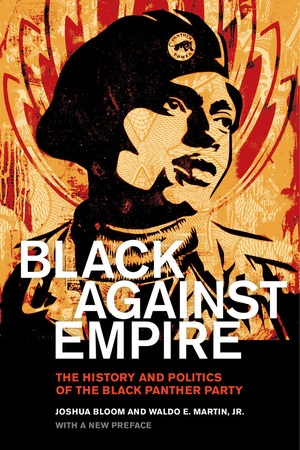In 1915, Dr. Carter G. Woodson, a pioneering black intellectual and the son of former slaves, recognizing “the dearth of information on the accomplishments of blacks . . . founded the Association for the Study of Negro Life and History, now called the Association for the Study of African American Life and History (ASALH).”
Dr. Woodson and the ASALH would later, in 1926, establish the celebration that would go on to become known as Black History Month, choosing the month of February in order to coincide with the birthdays of Frederick Douglass and Abraham Lincoln.
Today, the ASALH continues Dr. Woodson’s legacy as the progenitor of Black History Month by “disseminating information about black life, history and culture to the global community.”
Throughout our history, UC Press is proud to have published a great volume of work concerning the topics of black art, literature, politics, and more. Please join us throughout the month as we participate in this global celebration of black history.
Black against Empire
The History and Politics of the Black Panther Party, With a New Preface
by Joshua Bloom and Waldo E. Martin Jr.
“This is the definitive history of one of the great revolutionary organizations in the history of this country. Let us learn deep democratic lessons and strong anti-imperial conclusions from this magisterial book!”
—Cornel West, author of Race Matters
Black against Empire is the first comprehensive overview and analysis of the history and politics of the Black Panther Party. The authors analyze key political questions, such as why so many young black people across the country risked their lives for the revolution, why the Party grew most rapidly during the height of repression, and why allies abandoned the Party at its peak of influence. Bold, engrossing, and richly detailed, this book cuts through the mythology and obfuscation, revealing the political dynamics that drove the explosive growth of this revolutionary movement and its disastrous unraveling.
King and the Other America
The Poor People’s Campaign and the Quest for Economic Equality
by Sylvie Laurent
“An elegant and timely history of how black intellectuals have long made a case for the intersections between class and race.”
—The Nation
Shortly before his assassination, Martin Luther King Jr. called for a radical redistribution of economic and political power to transform the whole of society. In 1967, he envisioned and designed the Poor People’s Campaign, an interracial effort that was carried out after his death. This campaign brought together impoverished Americans of all races to demand better wages, better jobs, better homes, and better education. King and the Other America explores this overlooked and obscured episode of the late civil rights movement, deepening our understanding of King’s commitment to social justice and also of the long-term trajectory of the civil rights movement.
Race Women Internationalists
Activist-Intellectuals and Global Freedom Struggles
by Imaobong D. Umoren
“[Umoren’s] text answers [the] clarion call to take seriously the ideas set forth by Black women by looking for their thinking in unexpected places. The text’s comparative perspective, chronological breadth, and depth of analysis is ambitious, a scholarly project befitting the women it follows.
—Black Perspectives
Race Women Internationalists explores how a group of Caribbean and African American women in the early and mid-twentieth century traveled the world to fight colonialism, fascism, sexism, and racism. Based on newspaper articles, speeches, and creative fiction and adopting a comparative perspective, the book brings together the entangled lives of three notable but overlooked women: American Eslanda Robeson, Martinican Paulette Nardal, and Jamaican Una Marson. It explores how, between the 1920s and the 1960s, the trio participated in global freedom struggles by traveling; building networks in feminist, student, black-led, anticolonial, and antifascist organizations; and forging alliances with key leaders.
Making All Black Lives Matter
Reimagining Freedom in the Twenty-First Century
by Barbara Ransby
“This perceptive resource on radical black liberation movements in the 21st century can inform anyone wanting to better understand . . . how to make social change.”
—Publishers Weekly
In Making All Black Lives Matter, award-winning historian and longtime activist Barbara Ransby outlines the scope and genealogy of this movement, documenting its roots in Black feminist politics and situating it squarely in a Black radical tradition, one that is anticapitalist, internationalist, and focused on some of the most marginalized members of the Black community. From the perspective of a participant-observer, Ransby maps the movement, profiles many of its lesser-known leaders, measures its impact, outlines its challenges, and looks toward its future.
The Night Malcolm X Spoke at the Oxford Union
A Transatlantic Story of Antiracist Protest
by Stephen Tuck
“Tuck’s history reads like magazine journalism—packing both a kaleidoscopic, global view of race in the ’60s and a tight, propulsive story of Malcolm X’s December 1964 trip to England shortly before his death.”
—The Daily Beast
Less than three months before he was assassinated, Malcolm X spoke at the Oxford Union—the most prestigious student debating organization in the United Kingdom. The Oxford Union regularly welcomed heads of state and stars of screen and served as the training ground for the politically ambitious offspring of Britain’s “better classes.” Malcolm X, by contrast, was the global icon of race militancy. For many, he personified revolution and danger. Marking the fiftieth anniversary of the debate, this book brings to life the dramatic events surrounding the visit, showing why Oxford invited Malcolm X, why he accepted, and the effect of the visit on Malcolm X and British students.




